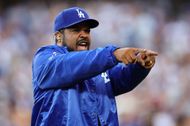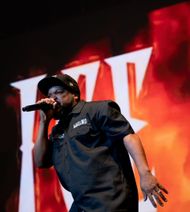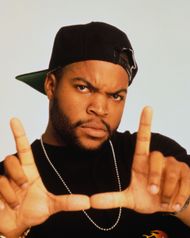O'Shea Jackson, better known as Ice Cube, did not merely enter the realm of hip-hop; he redefined it. With origins in the South Central Los Angeles streets, Ice Cube became an unapologetic voice of truth, initially rattling the system with N.W.A. and then forging his path as a solo act.
His songs have never been afraid to confront unpleasant truths, tending to blend aggressive beats with relentless social commentary on race, power, and society. Yet beneath the in-your-face aggression is a keen storyteller and lyrical artist whose legacy has endured.
His impact on the course of rap music lies in the naked truthfulness that characterizes his legacy. Among the classics that encapsulate Ice Cube's legacy are It Was a Good Day, Check Yo Self, No Vaseline, and You Know How We Do It. They all represent career standouts in his unapologetic honesty, social commentary, and West Coast attitude that made him a hip-hop legend.
While No Vaseline is the most brutal diss track in the history of hip-hop, It Was a Good Day is contemplative, reminding oneself about the peacefulness of mind one might achieve amid turbulence.
Disclaimer: This article contains the writer's opinion. Reader's discretion is advised!
Here are the top 8 Ice Cube songs that show why he’s a legend
Here are the best 8 Ice Cube songs that demonstrate why he is a legend, not only for his lyrically sharp rhymes, but for how he spoke for a generation. These songs represent the highs and lows of his career, from incendiary diss tracks to relaxed West Coast anthems.
Whether berating former friends, recounting an unusual moment of tranquility in South Central, or dropping hooks that became staples of hip-hop culture, these tracks demonstrate the scope and vigor that characterize Ice Cube's art. Each of them serves as a testament to his unparalleled presence and lasting influence on the form.
1) It Was A Good Day
Few hip-hop songs convey the sensation of temporary tranquility as accurately as Ice Cube's It Was A Good Day. In place of talk of riches and domination, Cube employs this 1993 single to recount an unusual, hassle-free day in South Central Los Angeles, a reprieve from his typical tension-ridden environment.

Constructed from a soul sample of the Isley Brothers' Footsteps in the Dark, the song substitutes aggression for introspection. Ice Cube takes listeners through a day in which all goes right: no sirens blaring, no beef to fight, a victory on the court, and a run-in with an old crush.
His laid-back flow over the relaxing production highlights how unusual such calm is, making what might otherwise be commonplace moments seem like special experiences. It is less about fantasy and more about happiness found in the mundane, which is why the song appeals to listeners across generations.
Read More: 10 famous songs you didn’t know were originally written for someone else
2) No Vaseline
When Ice Cube dropped No Vaseline in 1991, it was a turning point for rap diss tracks, not only because of its venom, but because of how personal it got. Rather than merely complaining, Ice Cube launched a full-fledged lyrical assault on his former N.W.A crew and their manager, Jerry Heller.
On a gruff, up-in-your-grill beat, Ice Cube dismantled his ex-members with razor-sharp insults, accusing them of betrayal and exploitation, and attacking them for making money on his material without giving due recognition. The track further singles out Heller with charges of manipulation and economic deceit.
Far from just a grudge vented in rhyme, No Vaseline established the blueprint for diss tracks, showcasing Ice Cube's eagerness to be ruthless and real. Its legacy remains a milestone where ego revenge collided with fierce lyricism and irreversibly altered hip-hop history.
Read More: 10 famous rap beefs that shook the hip-hop world
3) Friday
Moving away from the hard-boiled realism and hard-hitting social commentary that characterized much of his early career, Ice Cube's Friday is a lighter, more straightforward affair that captures the carefree nature of the film he was written for. Released in 1995 on the Friday soundtrack album, the song captures the joys of a South Central Los Angeles day off.

With its catchy and smooth rhythm, and heartfelt chorus sung by R&B singer Joi, the song captures the image of a young man relaxing after the week's troubles, getting his hair cut, hanging with the boys, riding around the 'hood, and getting girls to notice him.'
Ice Cube, aside from his typical edgy delivery for a casual, winking vibe, provides listeners with a glimpse at the quieter, nicer aspects of life in his neighborhood. Where struggle or survival would be the focus, Friday wallows in the charm of daily routines and the luxury of the weekend.
It is now a cult favorite over the years, not just for the hit song, but for how it captures 1990s West Coast culture in an innocent, yet easy-to-grasp fashion.
Read More: 8 Tate McRae songs you need on repeat
4) Endangered Species (Tales From The Darkside)
Endangered Species (Tales From The Darkside), which came out in 1990, was a no-nonsense, unapologetic protest album that encapsulated the horrors of police brutality and racism. The album starts with a no-nonsense foreboding beat that sets the mood for its brutal message.
Ice Cube's words bring alive the daily struggle of Black Americans, graphically describing the systemic repression they face — most tragically, the brutishness of police.

His verses are incredibly intimate yet absolutely accessible because he raps of developing in squalor-wreathed ghettos, and about constantly coming just shy of stumbling into police officers. The vocals of the chorus are by Public Enemy artist Chuck D.
The song is also a strong testament to Ice Cube's blunt willingness to broach sensitive, critical issues in his lyrics, thus making him not only an artist but also an outspoken voice for his people. In the broader context of hip-hop culture, Endangered Species is an unusual cultural artifact that helps the listener understand the ongoing efforts at racial justice and equality.
Read More: The evolution of BTS: Beyond the music, beyond the scene
5) Once Upon a Time in the Projects
Issued in 1990 on Ice Cube's groundbreaking solo debut album, AmeriKKKa's Most Wanted, the song Once Upon a Time in the Projects offers a realistic glimpse of life's tribulations suffered by those trapped in inner-city impoverishment. In his unrelenting account, Cube uncovers the devastating reality of living in the projects, exposing brutality, deprivation, and institutionalized oppression that characterized the lives of so many.
His words never deviate from the sense of futility that the young people feel in a world of limited possibilities for survival, where life is more like a war than an option of existence. The haunting, melodic undercurrent of the song makes Ice Cube's message more grave, and his stinging, precise delivery cuts with ruthless efficiency to amplify the effect of the song.
Once Upon a Time in the Projects is not only a song. It is a searing and evocative indictment of the desperation of the disenfranchised. It is a call to arms for those too often ignored by society.
Read More: Top 10 Cardi B songs that defined her career
6) You Know How We Do It
Ice Cube's You Know How We Do It, a song from his 1994 album, Lethal Injection, is a genre-defining party rap for West Coast hip-hop that puts life on ice in Los Angeles. The signature beat on the album is a slow thumping bass, as funk and soul sampling yield to the roots of the genre.

Cube's flow is smooth, laid-back, and cool as he struts on his easy but firm tone while rapping himself all around the streets of LA city, calling out the temptations and dangers of gang life, the high of getting wild at parties, and the crushing shadow of the police.
Although the album toyed with the edgier and grittier parts of city life, the mood of the track is overall celebratory, embracing the laid-back nature of the West Coast sound. You Know How We Do It is the standout track from Ice Cube's canon, a showing of his skills as a rapper and of hip-hop as a culture.
Read More: The 10 greatest Pink Floyd songs of all time
7) Gangsta Rap Made Me Do It
Ice Cube's 2008 release, Gangsta Rap Made Me Do It, is an abrasive and insistent critique of the power of gangsta rap within the broader social and political sphere. Remixed to electronic and classical hip-hop rhythms, the release is delivered in Cube's rugged, idiosyncratic flow before slipping into an exchange on social issues.
Through incendiary lyrics, the track broaches an entire host of issues concerning police brutality and censorship, to the role played by the media in glamorizing violence.

Rather than adopting a defensive posture about the genre, Ice Cube uses the track as an opportunity to castigate the proposition that gangsta rap lies behind social degeneration. The song also talks of the ugly realities encountered by many among the African American community.
The incessant refrain of the hook, Gangsta rap made me do it, attests to music's potential influence over attitude and behavior, as much as the systematic failures hard-coded into society, which have established violence and the crime experienced by the inner-city communities.
In an invitation to exchange at the site of the overlap between politics, culture, and media presentation of inner-city illness, the single is not an apologetic tract for the genre.
Read More: 8 must-listen Elvis Presley songs of all time
8) You Can Do It
Ice Cube's You Can Do It, recorded in 1999, is a motivational and uplifting anthem that challenges the listener to view his path through his hardship and accomplish his goals with unshakeable resolve. The hook-laden, frantic KLC beat is the perfect counterpart to its theme of unshakeable resolve. With its sing-along, catchy chorus performed by rapper Mack 10, the song hits one immediately and is more of an anthem in the making than a song.

Ice Cube's message is that success is not some kind of a luxury to be kept by a special set of individuals. Rather, it is something anyone can achieve by being determined, hardworking, and committed to themselves unconditionally. The message turns motivational, encouraging people from all walks of life to do their own thing despite the barriers they might face.
Contrary to a good vibe song, You Can Do It is Ice Cube's niche in crafting songs that resonate with his folk, and empower them and encourage them. The track encapsulates the idea that no dream is too big to achieve if you are willing to put in the effort, and it stands as a testament to the power of a positive mindset in overcoming adversity.
Read More: 10 legendary Tupac Shakur songs that made history
In short, Ice Cube's music career is a representation of his own personal and professional development as a performer and cultural figure. From his early collaborations with N.W.A. to becoming a successful solo act, he has never stopped using his voice to comment on matters of social justice, individual struggle, and the harsh realities of urban America.
His music today continues to speak to both the older and newer generations of fans, as a soundtrack to the trials of life and a message reminding everyone that with the right mindset, anything is possible. Through his body of work, Ice Cube has not only to entertained his legions of fans, but also ushered change and encouraged people to pursue their dreams.
Keep reading SoapCentral for more informative content!
Also Read: 10 famous rap beefs that shook the hip-hop world
